Rep. Shirley Chisholm’s seriously running for President
She says she’s “a dark horse, literally, a long shot” but she believes it’s possible.
WASHINGTON, September 14, 1971: Shirley Chisholm is seriously planning to run for President in 1972 and she says there is nothing symbolic about her candidacy.
“This is not a silly movement on the part of a woman who wants to be President,” she says.
The first black woman in Congress (she represents the Bedford-Stuyvesant district of Brooklyn, N.Y.) knows “all the reasons why I shouldn’t run. It’s a formidable, perhaps impossible task because I am simultaneously part of two minorities as a woman and a black.”
She’s a “dark horse, literally and figuratively — a long shot — but it can happen.”
If anything would give her pause it is the astronomical sum Presidential candidates must have to campaign. But she hasn’t “even started formal solicitation yet and the money is pouring in. Right now there are 22 fund-raising ventures planned in the United States and one abroad.”
Mrs Chisholm is considering entering the primaries in Wisconsin, Florida, North Carolina and New York.
“I should know definitely by the first of the year if the American people have raised the money to send me to the primaries.”
Her supporters, she says, are a “broad coalition of people who are looking for an alternative. They include youths, women, blacks, Mexican-Americans and other minorities, poor whites, Southern whites, and people from every segment of America.”
A Southern white woman sent her a $100 contribution for her campaign fund “because this country is in a mess and I am ready now to give a woman a chance for the Presidency. We need a strong woman.”
Mrs Chisholm, at 46, is attractive, curly-haired and petite and her strength is combined with a fragility that odd moments makes her seem vulnerable. She says that many of her colleagues “are having a field day. They think my candidacy is hilarious. Although there are some who don’t think it funny at all.” One of the possible contenders (she won’t say who) said recently, “don’t underestimate Shirley Chisholm. She is one of the shrewdest political animals operating today.”
She refuses to elaborate on her strategy.
“You don’t talk about what you are going to do. You just do it. That’s how I got elected to Congress.” But she admits that the large number of potential Democratic candidates may work in her favour.
“If I go into the North Carolina or Florida primaries, people will say, ‘she can’t win in the South.’ But if three or four white candidates enter these primaries, the vote will be split and there is a real possibility I will get the majority of black votes and some of the white votes. I just might pick up some delegates!”
“I don’t want to sound boastful,” Mrs Chisholm says. “There just seems to be a pattern to the life of Shirley Chisholm and it’s not so strange I’m a candidate. My role in history seems to be that of pathfinder. My whole life I have been so used to being first — first on many boards and commissions, first black woman in the New York State legislature and in Congress.”
Mrs Chisholm has no children and her husband, Conrad, who is with the Bureau of Medical Services in New York, has steadfastly supported her life’s endeavors.
“He’s a wonderful man,” she says, “and I am a happy woman. He always has said, ‘If people feel that you have what it is they are looking for, then you must go ahead. I will be here to give your strength, moral support and the big shoulder — “he’s a big man” — to cry on’.”
There are many times when Shirley Chisholm needs his support. “I get so tired, so discouraged sometimes. I’m not only a black representative on the part of my constituents but I am a Congresswoman for all my black brothers and sisters.” They crowd her office, many having travelled from Southern states to ask her help. She cannot turn them away, and she says she is able “by picking up the phone” to help many of them.
“You don’t know what it does to me,” she says with a sigh. “It brings home dramatically to me that my people don’t have enough representation to meet their unique needs in America today.”
Mrs Chisholm feels that her candidacy is part of the changes that are coming to America and she says with a small smile, “the American dream would indeed become reality if I become President.”
[This article originally appeared in The Washington Daily News, September 14, 1971 as Madame President: Shirley’s serious about the White House. #17 in a collection of more than 100 newspaper articles by Judy Flander from the second wave of the Women’s Movement reflecting the fervor and ingenuity of the women who rode the wave.]
